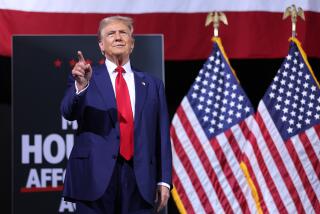Bush Seeks to Ease Travel for Disabled
- Share via
CLEVELAND — George W. Bush on Wednesday proposed $145 million in new federal spending to ease transportation problems for disabled workers.
The presumed Republican presidential nominee announced the plan at the end of a three-day campaign swing aimed at targeting issues traditionally of interest to Democratic voters.
The new money, to be spread over five years, would finance $45 million for 10 pilot programs offering innovative transportation alternatives for the disabled. Run by state or local governments in urban and rural areas, the programs could receive up to $1.5 million a year for three years, then be evaluated.
In addition, Bush proposed $100 million for long-term development of alternative transportation services tailored to individual needs.
Bush, noting that his father signed into law the landmark Americans with Disabilities Act while president, said his proposals were designed “to make sure the transportation bottleneck is relieved for disabled workers.”
He added: “People from all walks of life should have access to the American dream. People from all walks of life can be productive citizens.”
Bush made his comments during a visit to Vocational Guidance Services Inc., a government-supported center providing job placement and other help to disabled people.
Later, in a news conference at the center, Bush said he had chosen heavily Democratic Cleveland to unveil his proposals for the disabled “to send a message that ours may be a conservative philosophy, but with compassionate results.”
“I’ve been here a lot, and I’m coming back a lot, sometimes to neighborhoods where Republicans have not often been seen,” he said.
Earlier this week, the Texas governor offered proposals to reform the Immigration and Naturalization Service before the League of United Latin American Citizens in Washington, addressed the Congress of Racial Equality in New York and promoted welfare reform at a job training center in Detroit.
Aides said the trip was designed to project Bush’s philosophy of “compassionate conservatism” to Latino, African American and other voting groups that traditionally favor the Democrats.
Bush said he believed the GOP has been unfairly tagged “as against things . . . anti-immigration” and lacking “a commitment to public schools and a public education system.”
“Slowly but surely,” he said, “I’m beginning to change that perception.”
The depth of Bush’s commitment to helping the disabled was quickly challenged by supporters of Vice President Al Gore, the expected Democratic nominee.
“It’s a tiny amount of money relative to the problem,” said Justin Dart, a longtime advocate for the disabled who served in the administrations of Ronald Reagan and George Bush, the candidate’s father.
“We had pilot programs on transportation at least 20 years ago,” Dart said in a conference call with reporters arranged by the Gore campaign. “It’s a little mystifying why we need pilot programs now.”
Belinda Carlton, a Texas advocate for the disabled who said she had clashed repeatedly with Bush during his tenure as governor, also criticized his record on the issue. “We don’t need pilot programs,” she said. “We need compliance with existing laws and programs.”
Carlton said that, under Bush, state agencies had resisted making roads and other public facilities more accessible.
Also at his news conference in Cleveland, Bush again discussed his criteria for selecting a running mate.
“The person has to be able to be the president and has to be loyal,” he said. “I’m a team builder. I’m very much interested in having somebody on the team who’ll be able to express his or her opinions, and once a decision is made, to recognize who the ultimate decision-maker is.”
From watching his father’s presidency, Bush said, he learned that “leaks and public disagreements can create havoc within an administration. I’d like my vice president to be someone with whom I could get along.”
More to Read
Sign up for Essential California
The most important California stories and recommendations in your inbox every morning.
You may occasionally receive promotional content from the Los Angeles Times.













